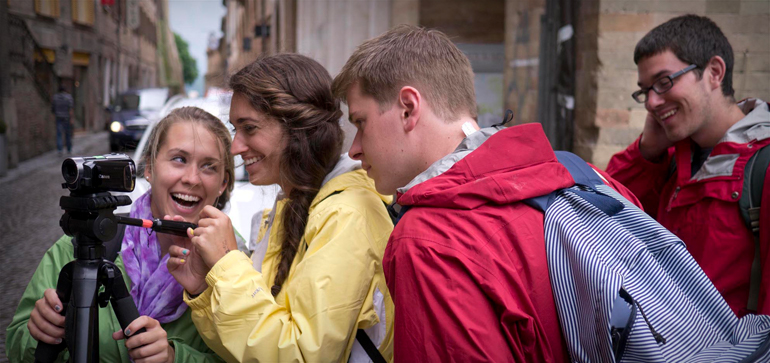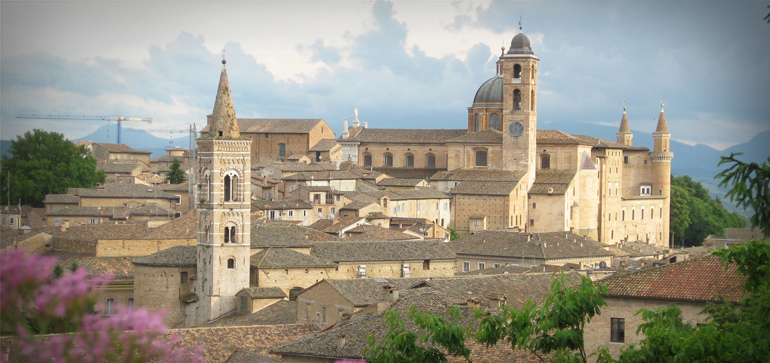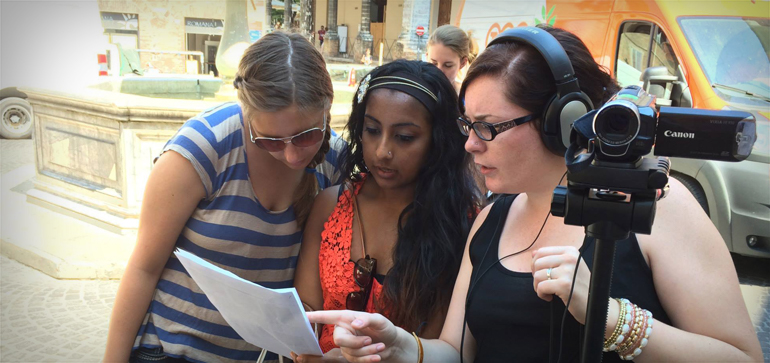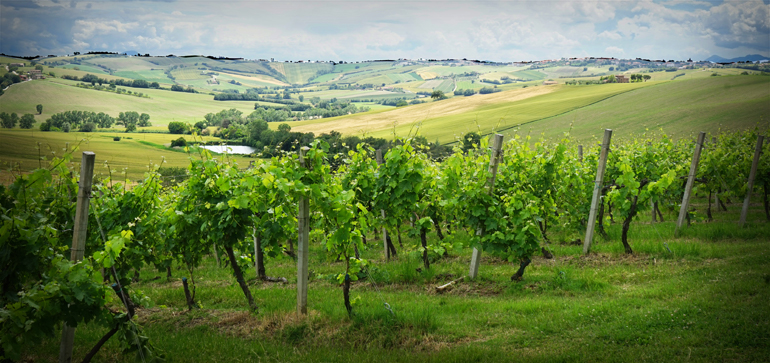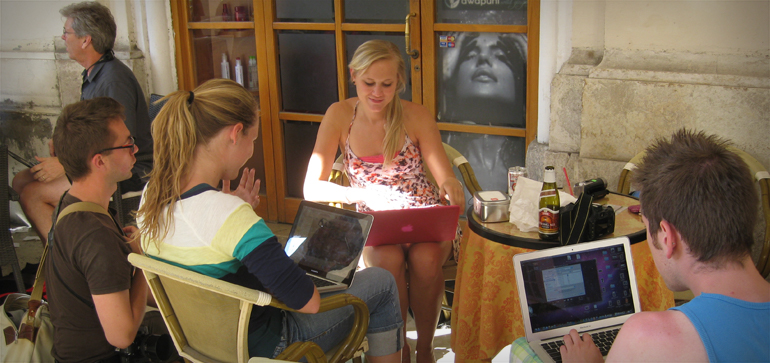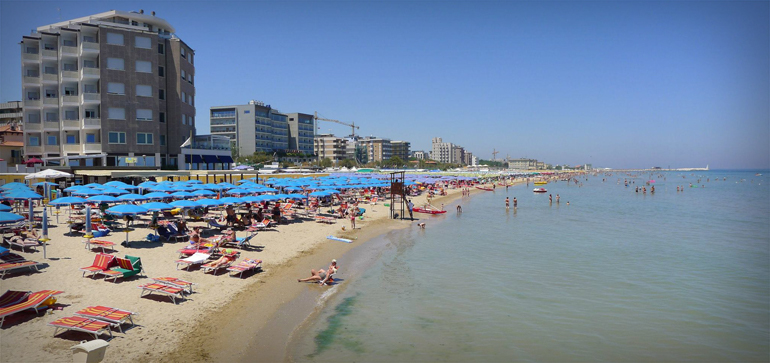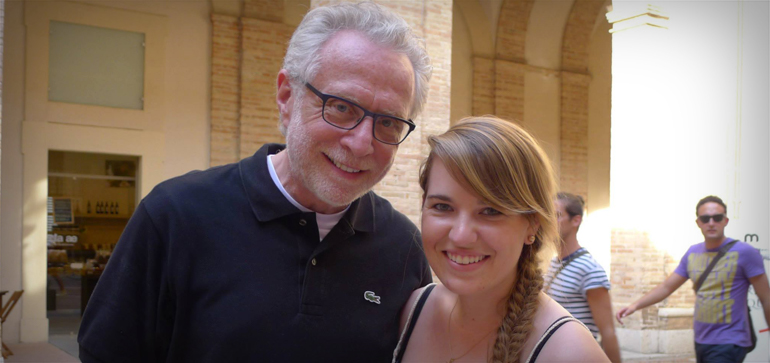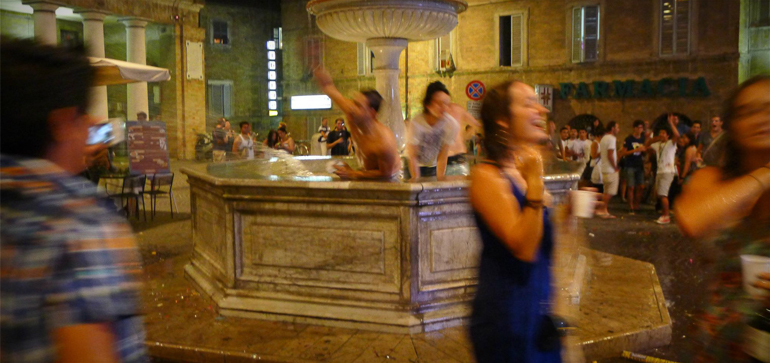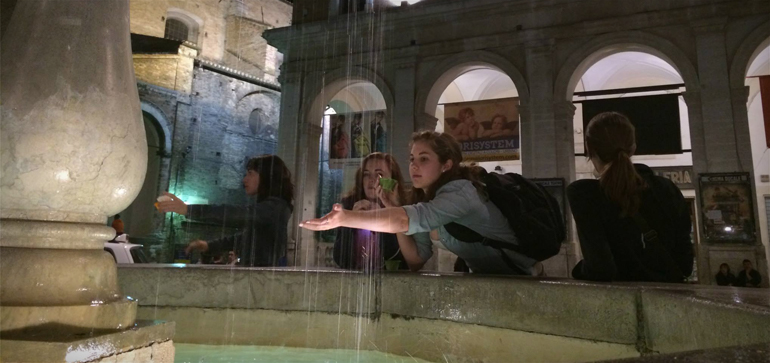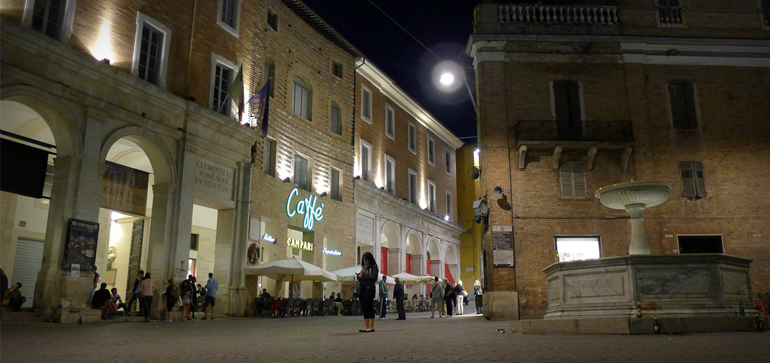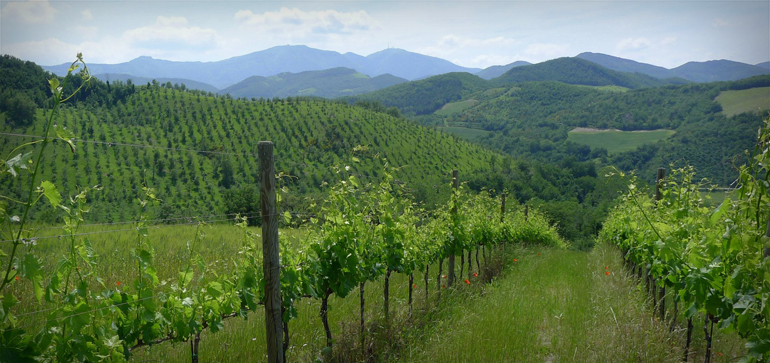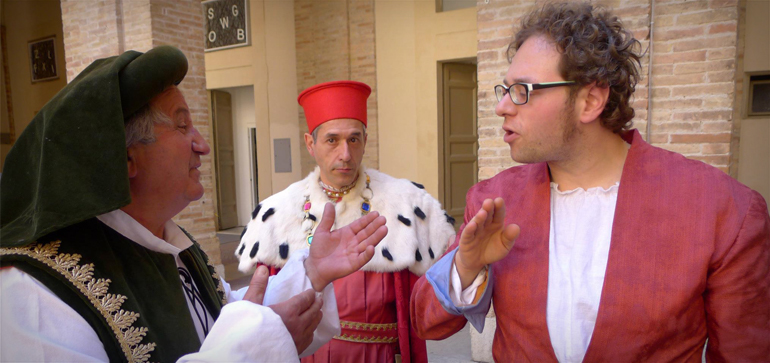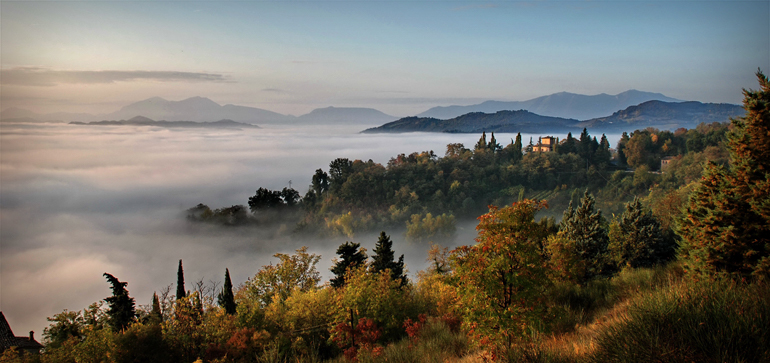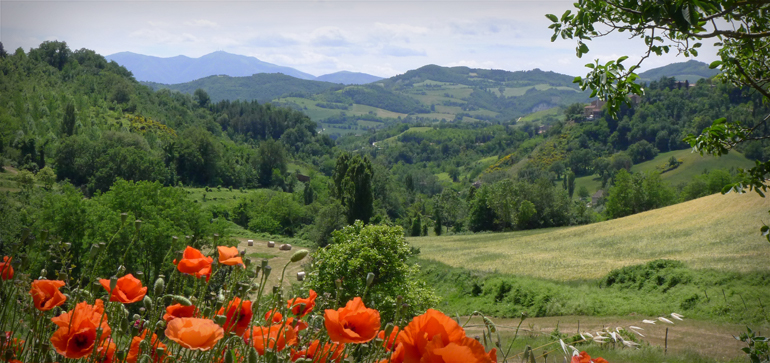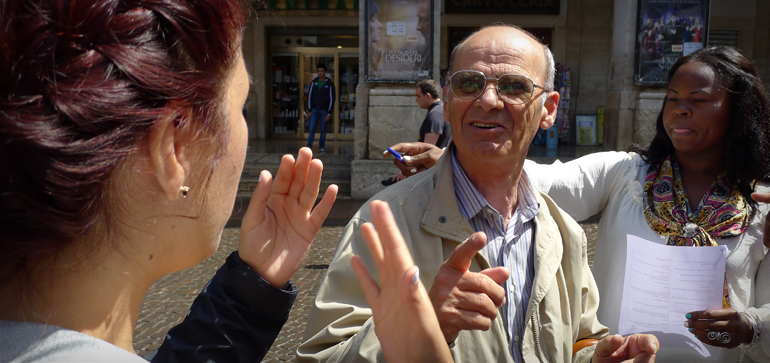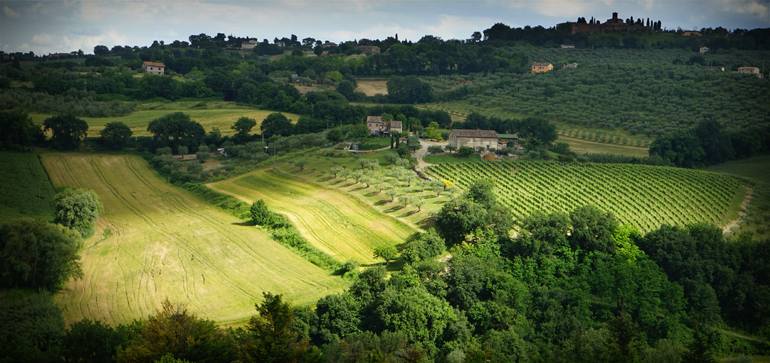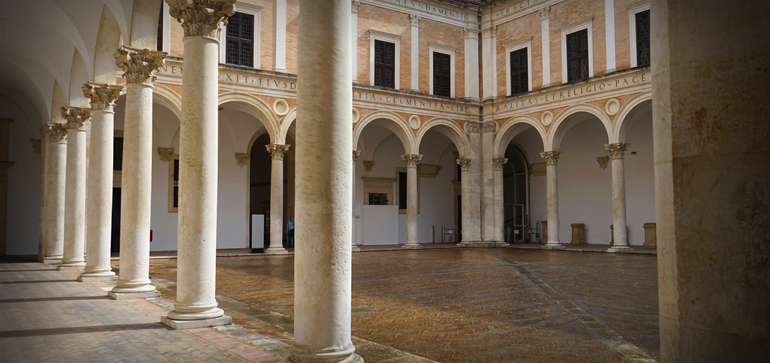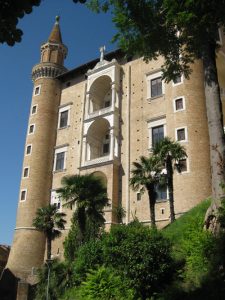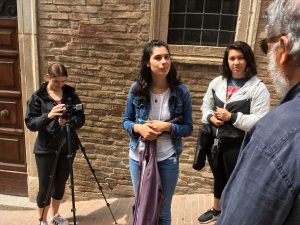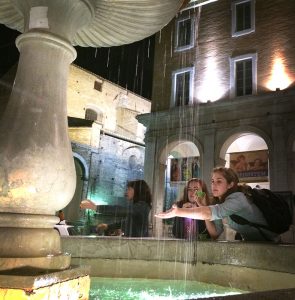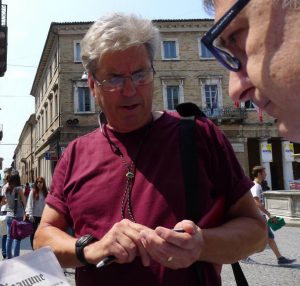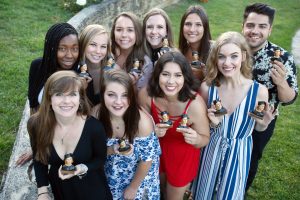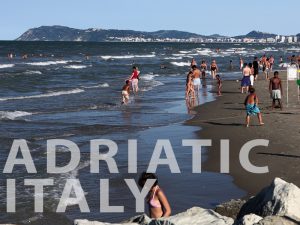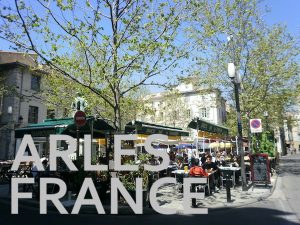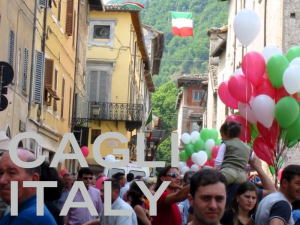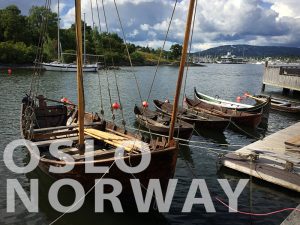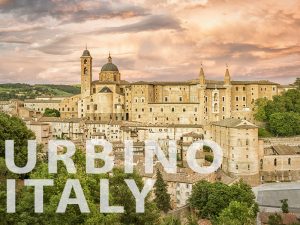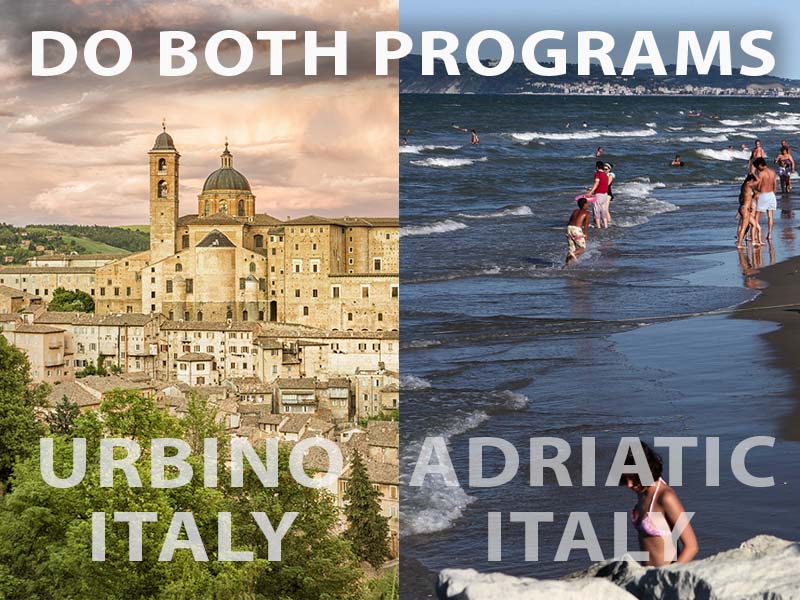Urbino, Italy
Urbino enrollment is closed. If interested in Italy programming, please check out the Cagli and Adriatic programs!

Urbino Fact Sheet
Apply now to reserve your place in Urbino, Italy.
GENERAL LOCATION: Le Marche Region of Italy, Urbino
ENROLLMENT CAPACITY: 65
FOCUS: Immersion in Multimedia Journalism (writing, photography, video) or Long-form/Non-fiction Journalism (with a strong emphasis on photography) resulting in a website and magazine. ieiMedia's PR and Marketing program will provide students with an overview and appreciation for the changing nature of the global PR industry. Students will have the opportunity to partner with local businesses to create custom PR programs to support merchants and participate in the development of a large regional multi-dimensional campaign to encourage outside tourism to the region.
COOPERATING UNIVERSITIES: University of Jamestown, James Madison University, Colorado State University, Rider University, University of Urbino
PROGRAM COST:
TUITION: $5,345
CREDIT: $450
TOTAL COST: $5,795 + airfare
INCLUDES: Tuition – 3 credits; university dorm accommodations; transportation from Rome airport to Urbino and return; breakfast, lunch and dinner on most days; travel insurance; opening reception & dinner, awards ceremony & farewell dinner; and program activities. DOES NOT INCLUDE AIRFARE. Note: This program is an ideal companion to the four-week Urbino program in multimedia journalism.
APPLICATION DEADLINE: Application Deadline is February 9, 2024. If you do not have the necessary access to submit your application by the deadline, start a conversation with us by clicking the Get Started button below. Please refer to the Application Deadline Details below for more information.
PAYMENT DEADLINES:
see Payment, Cancelation and Refund Policy for information on deposit deadlines and amounts.
ENROLLMENT CAPACITY AND WAITLISTS:
ieiMedia projects have a defined capacity limitation for applicants. Since there is a limited number of applicants who can attend, you can only be guaranteed a spot when you (1) have paid your Application Fee and (2) made payments on time according to the Costs and Payment Schedule. Read more about our late payments policy here.
FINANCIAL AID: Students studying abroad for the summer term have limited financial aid options, but Pell grant recipients are encouraged to apply and receive our help in applying for a Gilman Study Abroad Scholarship which can award up to $5,000. Check with your school’s financial aid office and your study abroad offices to find out if other assistance is available. For more information on financial aid, get started by connecting with us here.
The Urbino Project
Urbino lies in the northern part of central Italy’s Marche Region, nestled between the Apennine Mountains and the Adriatic Sea. Many say the Renaissance started here under the patronage of Duke Federico da Montefeltro, whose twin-turreted palace still houses an outstanding collection of period art. Work with a team of experienced media professionals to create multimedia publications about the town of Urbino, Italy, and get a taste of being a foreign correspondent and digital storyteller.
Students will live and learn at the University of Urbino, with two meals per day included. No Italian language proficiency is required. Students will work with University of Urbino students who serve as translators/interpreters.
Students who sign up for Multimedia Journalism will study photography, international reporting, and video, and will produce a website about the city. Those who sign up for Long-form/non-fiction Journalism will study photography, international reporting, and feature writing where your work will be part of the website.
Students who register for the PR & Marketing track will study the changing nature of the global public relations arena and its convergence with marketing. Focus will be on understanding the nuances and sensitivities that go into creating, designing, and implementing a global PR/marketing campaign. Over the four-week session, students will work closely with the owners of local businesses in Urbino to create a tourism campaign for the region.
- Instruction will come from a combination of traditional classroom teachings and field experience, with the program's overall goal to be one centered in experiential learning.
- Lectures will be from ieiMedia faculty and outside industry professionals from around the world.
- Possibility of visiting PR firms in local towns and neighboring cities.
The programs include full room and board in a University of Urbino dormitory.
During this four-week program, you will learn how to:
- Research and report a story in a foreign setting.
- Produce multimedia content for a website or produce articles and photos for a feature story.
- Tell stories in ways that incorporate text, photos, video, and interactive elements.
- Work with an interpreter.
The City
Urbino is a picturesque Renaissance hill town and the jewel of the Marche region of central Italy. Although Urbino was a Roman and medieval city, its peak came during the 15th century when Duke Federico da Montefeltro established one of Europe’s most illustrious courts. Urbino’s historic center is a UNESCO World Heritage Site.
Urbino is relatively small and off the beaten path of tourists, yet it's a hip college town with one of the oldest universities in Italy. The town is nestled on a sloping hillside and the surrounding scenery is awe inspiring. You're not likely to see buses with large groups of tourists here.
Beautiful Adriatic beaches are a short distance away and reachable via local bus service that runs multiple times per day. Florence and Venice are easily reachable via train in the nearby town of Pesaro.
The University
The University of Urbino was founded in 1506, and currently has about 20,000 students, many of whom are from overseas. The university has no central campus as such, and instead occupies numerous buildings throughout the town and in the surrounding countryside.
Recent Urbino Multimedia Projects
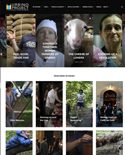 Between May 24 and June 21, 2019, 27 student journalists developed multimedia journalism stories to document the people and places of Urbino and the Marche Region of Italy. They came from James Madison University, Washington and Lee University, Colorado State University, Ithaca College, Boston University, and Winston-Salem State University.
Between May 24 and June 21, 2019, 27 student journalists developed multimedia journalism stories to document the people and places of Urbino and the Marche Region of Italy. They came from James Madison University, Washington and Lee University, Colorado State University, Ithaca College, Boston University, and Winston-Salem State University.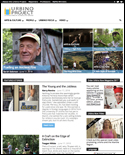 Between May 25 and June 22, 2018, 30 student journalists developed multimedia journalism stories to document the people and places of Urbino and the Marche Region of Italy. They came from James Madison University, Colorado State University, Ithaca College, Georgia College and State University, Frostburg State University, and the University of Wisconsin Oshkosh.
Between May 25 and June 22, 2018, 30 student journalists developed multimedia journalism stories to document the people and places of Urbino and the Marche Region of Italy. They came from James Madison University, Colorado State University, Ithaca College, Georgia College and State University, Frostburg State University, and the University of Wisconsin Oshkosh.Check out the content Urbino students produced over the years:
2023.urbinoproject.com
2022.urbinoproject.com
2019.urbinoproject.com
2018.urbinoproject.com
2017.urbinoproject.com
2016.urbinoproject.com
projects.ieimedia.com/2015urbino
projects.ieimedia.com/2014urbino
projects.ieimedia.com/2013urbino
projects.ieimedia.com/2012urbino
and the Eppy Award-winning 2011 site at projects.ieimedia.com/2011urbino.
Recent Long-form Projects
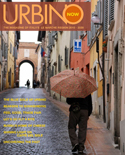 Check out the latest travel magazine produced by our students in the magazine journalism program: Urbino Now 2019.
Check out the latest travel magazine produced by our students in the magazine journalism program: Urbino Now 2019.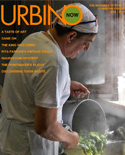 Check out the 2018 travel magazine produced by our students in the magazine journalism program: Urbino Now 2018.
Check out the 2018 travel magazine produced by our students in the magazine journalism program: Urbino Now 2018.
You can also view earlier editions of the magazine for these years: 2017, 2016, 2015, 2014, 2012, 2011, and 2010 (in print and digital formats).
Academic Credit
Journalism Course (3 credits)
Students in the Urbino, Italy, program can sign up for either Section 1 Multimedia Journalism or Section 2 Long-form Journalism.
Students in Section 1 Multimedia Journalism will study photography, international reporting, and video, and will produce content for a website about the community. Each student will be required to write and create a slideshow and/or shoot and edit a short video story.
- 2022 Multimedia Journalism Syllabus
Students in Section 2 Magazine Journalism and Photography will study feature reporting, writing, and photography, and will create content for a website about Urbino and the surrounding area. Each student will produce text and photos for a full-length feature article.
- 2022 Magazine Journalism and Photography Syllabus
Coached by teachers who have won Pulitzer Prizes and other top journalism awards, students in both sections will work on skills critical for successful journalism, including the basics of reporting and telling compelling stories, through both words and images. Students will learn how to navigate as professional journalists in a foreign culture by working with interpreters and crafting ready-to-publish features and news stories.
University Credits
Students will sign up for 3 credits from our partner university, University of Jamestown. Credits are transferable and may be accepted for journalism elective credit by your college or university.
Travel Opportunities
Students will have three-day weekends (Fridays, Saturdays and Sundays) free to explore the city, or to travel within Italy. Florence, Rome, Bologna and Venice are accessible by bus and train; regional buses from Urbino serve many charming, small towns in the region. Those who want to tour extensively should plan travel time before or after the program.

Florence
Many students travel to Florence on long weekends via bus and train.
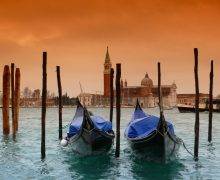
Venice
Venice is a popular weekend destination for students.
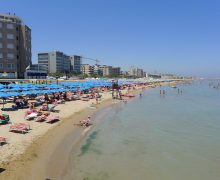
Adriatic Beaches
Popular Adriatic beaches in Pesaro or Fano are a close distance away.
Students
The program is open to English-speaking college students and recent graduates from any school. Students from many universities have participated in past ieiMedia programs, including: James Madison University, Colorado State University, Ithaca College, Iowa State University, Rider University, the University of Tennessee at Chattanooga, Louisiana State University, Virginia Tech, Ryerson University, New York University, UCLA, Truman State University, Rutgers University, University of Wisconsin-Milwaukee, Georgia College and State University, Frostburg State University, University of Wisconsin-Oshkosh, Kennesaw State University, California State University Fullerton, Temple University, Arizona State University, State University of New York at New Paltz, University of Arizona, University of Illinois, Georgetown University, University of Northern Iowa, University of Wisconsin-Madison, Humboldt State University, Indiana University, Washington and Lee University, Wilkes University, Carleton University, San Diego State University, American University, Nanyang Technological University, University of British Columbia, Westminster College and Baylor University. We’ve also had students from Japan, the United Kingdom, Puerto Rico, Thailand and Trinidad.
Most of our students are journalism or communications majors, but those majoring in other subjects are welcome as well. For non-journalism/communication majors, experience working for a college or professional publication is helpful but not necessary. The program is open to English-speaking students and recent graduates from around the world.
Graduate students are also invited to apply. We’d be happy to talk with you about supervising an independent project that would qualify for graduate credit at your school — or to offer this experience as a graduate internship.
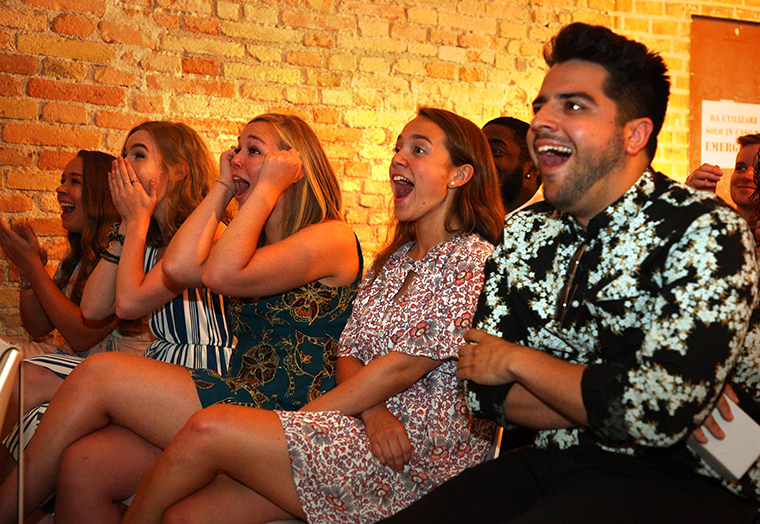
Students enjoying the end of program video at our awards ceremony.
Faculty
Our faculty come from leading universities and news organizations. In 2024 our faculty will likely include:
PROGRAM DIRECTOR
Greg Luft has recently been appointed as the interim Vice President of Marketing and Communications at Colorado State University. Prior to that he as held a position with the university as a professor and chair of the Journalism and Media Communication department. Greg is also an award-winning reporter and photojournalist, with a diverse career in television news and documentary production before and during his career in academia. He began teaching in Urbino in 2012. Greg served as academic dean on the Spring, 2019 Semester at Sea voyage, has served as a visiting professor at the Communication University of China in Beijing, and was named a Colorado State University Best Teacher in 2013.
FACULTY
(Subject to enrollments/budget)
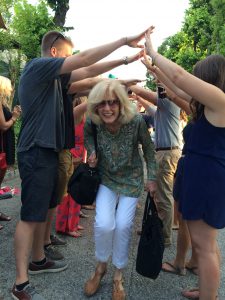
Photography instructor Susan Biddle has worked as White House photographer and as a photojournalist at the Washington Post.
Susan Biddle was a Washington Post staff photographer for thirteen years and now freelances for the Post as well as other publications and organizations. As a White House photographer, she documented the Presidency for the last year of the Reagan administration and all four years of the George H.W. Bush administration.
Rustin Greene spent his first career as a television writer/producer/director, earning two Los Angeles Area EMMY awards and three Cable ACE awards. Rusty is now in his second career, teaching in James Madison University’s School of Media Arts and Design.
Elisabeth Kvernen currently works as an Assistant Professor at the School of Media Arts & Design at James Madison University in Harrisonburg, Virginia. She is a graphic designer and communications specialist with more than a decade of experience working in multiple design disciplines. She has worked with non-profit organizations, cultural institutions, universities, and small businesses — both locally and globally. Past clients include the Smithsonian Institution, the Library of Congress, the Louvre Museum, the New York Public Library, and the Kennedy Center. Elisabeth teaches magazine design in Urbino.
Kathryn Lancioni is lecturer in the School of Communication and Information at Rutgers University. She is an award-winning, internationally recognized expert in the field of communications and was recently named as one of PR News' "People of the Year." Her expertise lies in the intersection of communication, technology, and society. Ms. Lancioni has a unique appreciation and understanding of its dynamic landscape working as a journalist, public relations executive, communications strategist, and college professor. She has worked for some of the world’s leading PR agencies and with numerous global corporations, and in 2006 she launched Presenting Perfection, a communications consultancy. Ms. Lancioni has served on the faculty of Fairleigh Dickinson University, Montclair State University, Seton Hall University, St. John Fisher College, and William Paterson University, has guest lectured at various universities, and has been the featured speaker at many international conferences. She is the author of three books, a regular contributor to Medium, and a member of The Forbes Business Council.
Dorian Geiger, an ieiMedia Urbino alum, is an award-winning Canadian journalist, producer, and filmmaker based in New York City. He has a diverse background in breaking news, digital video, and media strategy and is a currently a full-time writer-producer at LinkedIn News. He also serves as a part-time national crime reporter for NBC Universal. His journalism has been featured by The New York Times, POLITICO, Al Jazeera English, AJ+, The Guardian, The Daily Beast, TIME Magazine, Fortune, VICE, The New York Post, NowThis, Teen Vogue, the BBC, Insider, The Root, The Toronto Star, CBC, The Canadian Press, and others. In 2015, Dorian directed the documentary, "Glen's Village,” which won a National Award for Education Reporting in the category of best news single topic feature.
Barry Janes works and teaches electronic media theory, programming and technology at Rider University. He has been a producer, director and/or writer of more than 100 video productions, and has advised numerous corporations, non-profit organizations and municipalities.
Bob Marshall is a New Orleans journalist whose reporting on Louisiana coastal issues at The Times-Picayune and The Lens has been recognized by two Pulitzer Prizes; the John H. Oakes Prize for Distinguished Environmental Reporting from Columbia University; the Keck Award for best science reporting from The National Academies of Sciences, a national Edward Murrow Award from the Radio, Television and Digital News Association, Gannett Award for Innovative Watchdog Journalism from the Investigative Reports and Editors Association, The National Headliners Award and many others.
Robert A. Reeder has taught photojournalism as well as mentored graduate photojournalism students at the Corcoran College of Art and Design in Washington, DC. His work has been widely published and recognized by White House Press Photographers Association, National Press Photographers Association, as well as other organizations.
PAST FACULTY
Steven D. Anderson is a professor in the James Madison University School of Media Arts & Design. He is also a former environmental reporter at KCNC television, a network O&O station in Denver, Colorado. His reporting often involved in-depth examination of local and regional environmental issues and an explanation of the science behind them.
Deni Chamberlin is an associate professor of journalism at Iowa State University, a Pulitzer Prize-winning photojournalist and the Director of Photography at the Food & Environment Reporting Network. She has more than 20 years experience as a newspaper and magazine photojournalist and has worked for publications such as TIME, The New York Times Sunday Magazine and National Geographic.
Doug Cumming, Ph.D. is an associate professor of journalism at Washington & Lee University with 26 years experience at metro newspapers and magazines.
Michael Gold has been a writer, editor, and manager at award-winning publications, in print and online. He started his career as a reporter at the Bergen County (NJ) Record and the Boston Herald American. He was a founding writer and editor for Science 80, which won three National Magazine Awards while he was there. As a consultant for West Gold Editorial, he helped conceive and launch University Business and Dwell magazines as well as Thrive, an online health network produced by Time, Inc. and AOL.
Susan West is a principal at West Gold Editorial consulting, where she has helped launch magazines such as Dwell, trained online editors at websites such as BabyCenter, and advised publications from the New England Journal of Medicine to Cooking Light and Acoustic Guitar.
View complete faculty biographies on our Urbino Faculty Page.
Accommodations
Students will live in a student residential building in a single or double room. A few students will stay in a triple room. The building is located in the center of Urbino just 40 yards from the main piazza and the Palazzo Ducale. Our classrooms and the another main piazza (Piazza della Repubblica) are within a short walking distance. Two tasty, varied meals a day in the nearby student cafeteria are included. Laundry facilities are also on the premises. Sheets, towels, and a pillow will be provided.
Equipment
Students are expected to bring a laptop computer and digital camera. Digital high-definition video cameras, microphones (handheld, lavalier and wireless) and tripods are provided by ieiMedia. Some digital still cameras will also be provided for those who need them.
Interpreters
When reporting you will work with University of Urbino students, who will act as interpreters. In the past, students have found the process of working with these Italian students to be one of the most rewarding experiences in the program.
Program Cost
The cost is $5,795 plus airfare. This includes tuition, 3 credits, housing, most meals, instruction, basic travel insurance, farewell dinner, special programs and transfers from and to the airport in Rome.
Application Deadline Details
Our application deadline for Summer 2024 programs is February 9, 2024. Applications submitted after the deadline will be accepted on a rolling basis dependent on program capacity.
Submitting your application by the priority deadline means you will be accepted to a priority spot on the program of your choosing, as well as secure additional time to prepare for payment deadlines and scholarship and financial aid opportunities.
If you do not have the necessary access to submit your application by the deadline, please reach out to admissions@ieimedia.com to speak with an advisor.
Application deadline: Application Deadline is February 9, 2024. ROLLING ADMISSIONS UNTIL PROGRAM IS FULL. Applications received after the deadline can be accepted until program capacity limitations are reached.
TRAVEL ADVISORY: ieiMedia will be monitoring the situation with COVID-19 and will provide status updates to those who sign up for the program.
VACCINATIONS: Students must be vaccinated against COVID-19 to participate in the program.







